- 1计算机会议等级排名_wacv会议的级别
- 2Dubbo:搭建监控中心(dubbo-monitor-simple)_dubbo monitor
- 3R语言dataframe数据索引、访问: 使用中括号[]和列号索引访问dataframe数据的指定列_dataframe 列访问
- 4PySpark数据分析基础:PySpark基础功能及DataFrame操作基础语法详解_pyspark rdd.map和pandas udf哪个快
- 5LSTM 股价预测pytorch_data = raw_data.loc[:, ['close']]
- 6【Ambari】HDP单机自动化安装(基础环境和MySQL脚本一键安装)_自动安装mysql
- 7雨云游戏云面板服使用教程&我的世界Forge服务端开服教程(翼龙面板)_服务端 forge换arclight
- 8剖析ELF文件格式的内容———文件头,段表,符号....(第三章)_elf文件头
- 9计算机网络之——TCP传输控制协议(三握四挥)_tcp交互不发送数据包
- 10航空公司业务问题分析_late aircraft delay
FLV 格式:为什么直播首选这个流媒体格式?丨音视频基础_flv测试视频直播流
赞
踩
(本文基本逻辑:FLV 封装格式概览 → Audio Tags 解析 → Video Tags 解析 → Data Tags 解析)
FLV(Flash Video)是 Adobe 公司推出的一种流媒体格式,它的特点是封装后的音视频文件较小、封装规范简单,因此适合在互联网上进行传输和使用。在浏览器普遍支持 Flash 插件的时代,FLV 格式的视频非常流行。但是随着主流的浏览器平台逐步放弃了对 Flash 插件的支持后,以及移动互联网的兴起,App 取代浏览器成为更多内容的载体,在短视频领域 FLV 的地位逐步被 MP4 取代。但是,在直播领域,由于 RTMP 推流、HTTP-FLV 播放的整套方案低延时的特性,以及服务端普遍提供 HTTP Web 服务,能更广泛的兼容 HTTP-FLV,使得 FLV 仍然是大多数直播产品的首选流媒体格式。
1、FLV 格式概览
FLV 文件由一个 FLV Header 和一个 FLV Body 组成,在 FLV Body 中则由多组 (PreviousTagSize + Tag) 组成。
FLV 中 Tag 的类型有三种:
- Audio Tags
- Video Tags
- Data Tags
Tag 中包含着 audio、video、scripts 的元信息,加密信息(可选)以及对应的实际数据。
总体来讲,FLV 的结构大致如下表所示:
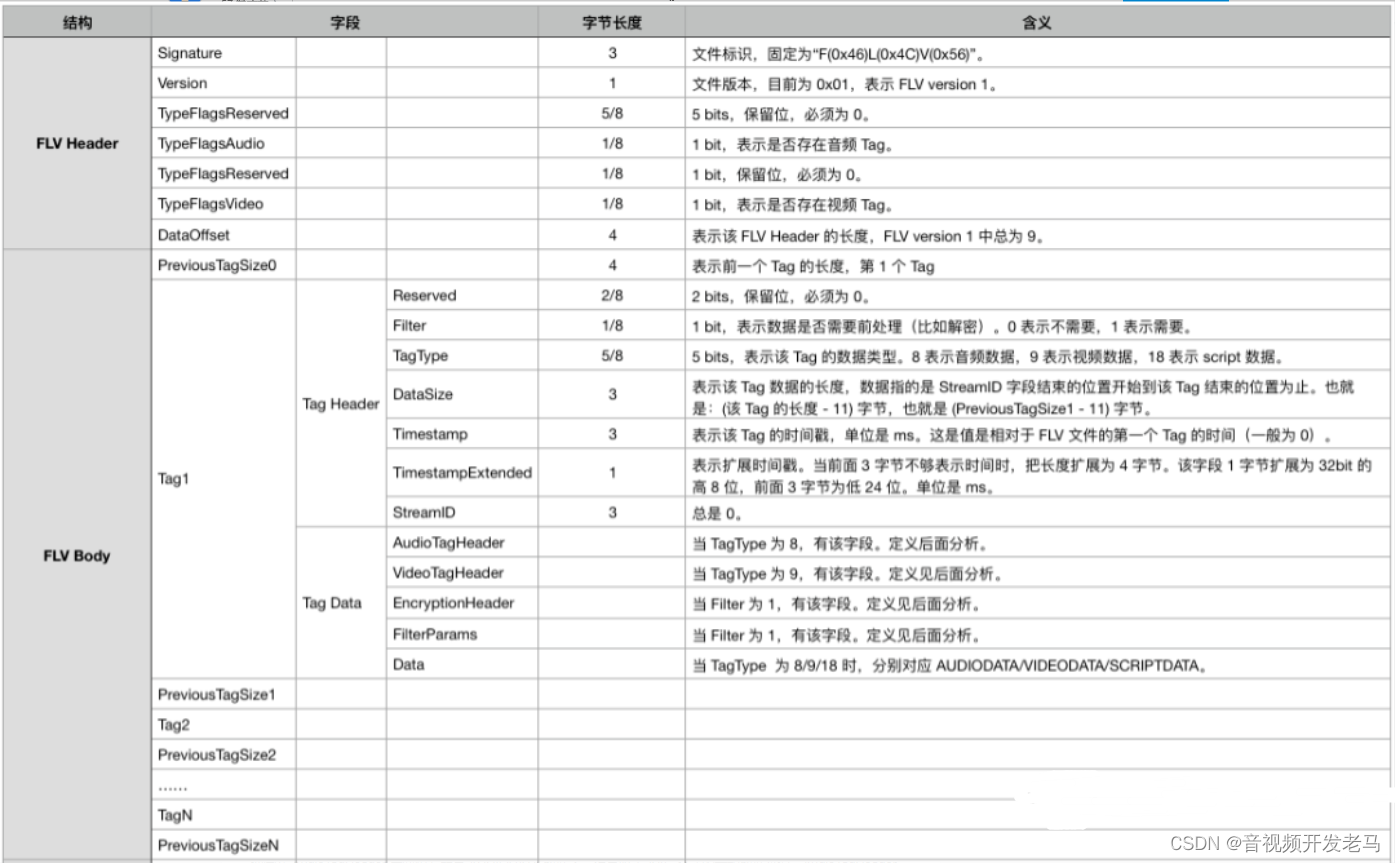
2、Audio Tags 解析
Audio Tag 的结构大致如下所示:

通常在 AudioTagHeader 后面跟着就是 AUDIODATA 数据了,但是对于 AAC 格式的音频数据来说,AudioTagHeader 会多一个字段 AACPacketType 来表示 AACAUDIODATA 的类型:如果 AACPacketType 为 0,那么数据对应的是 AudioSpecificConfig;如果 AACPacketType 为 1,那么数据对应的为 Raw AAC frame data。
为什么 AudioTagHeader 中已经有了音频的相关参数,还需要在这里来一个 AudioSpecificConfig 呢?这是因为当 SoundFormat 是 AAC 时,SoundType 需要设置为 1(立体声),SoundRate 需要设置为 4(44k Hz),但这并不说明文件中 AAC 编码的音频必须是 44k Hz 的立体声。播放器在处理 AAC 音频时,需要忽略 AudioTagHeader 中的音频参数,而使用 AudioSpecificConfig 的参数来初始化解码器。
在 FLV 的文件中,一般情况下 AudioSpecificConfig 只会出现一次,即第一个 Audio Tag。如果音频使用 AAC,那么这个 Tag 就是 AAC sequence header,即 AAC 音频同步包。AudioSpecificConfig 的结构在 ISO/IEC-14496-3 Audio 标准中有做说明。
下面是 ISO/IEC 14496-3, 1.6.2.1 AudioSpecificConfig:
- AudioSpecificConfig() {
- audioObjectType = GetAudioObjectType();
- samplingFrequencyIndex; // 4 bslbf
- if (samplingFrequencyIndex == 0xf) {
- samplingFrequency; // 24 uimsbf
- }
- channelConfiguration; // 4 bslbf
- sbrPresentFlag = -1;
- psPresentFlag = -1;
- if (audioObjectType == 5 || audioObjectType == 29) {
- // ...
- }
- else {
- extensionAudioObjectType = 0;
- }
- switch (audioObjectType) {
- case 1: case 2: case 3: case 4: //...
- GASpecificConfig();
- break:
- case ...:
- //...
- }
- if (extensionAudioObjectType != 5 && bits_to_decode() >= 16) {
- //...
- }
- // ...
-
- GetAudioObjectType() {
- audioObjectType; // 5 uimsbf
- if (audioObjectType == 31) {
- audioObjectType = 32 + audioObjectTypeExt; // 6 uimsbf
- }
- return audioObjectType;
- }

下面是 ISO/IEC 14496-3, 1.5.1.1 Audio object type definition:
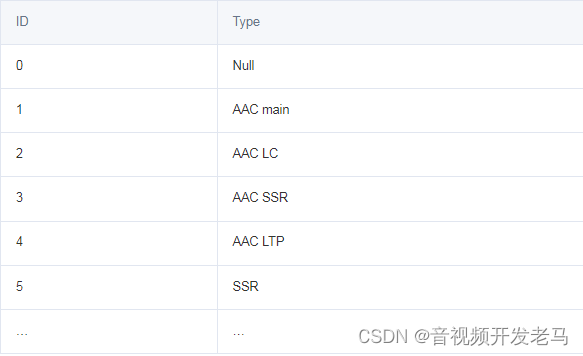
下面是 ISO/IEC 14496-3, 1.6.3.4 samplingFrequencyIndex:
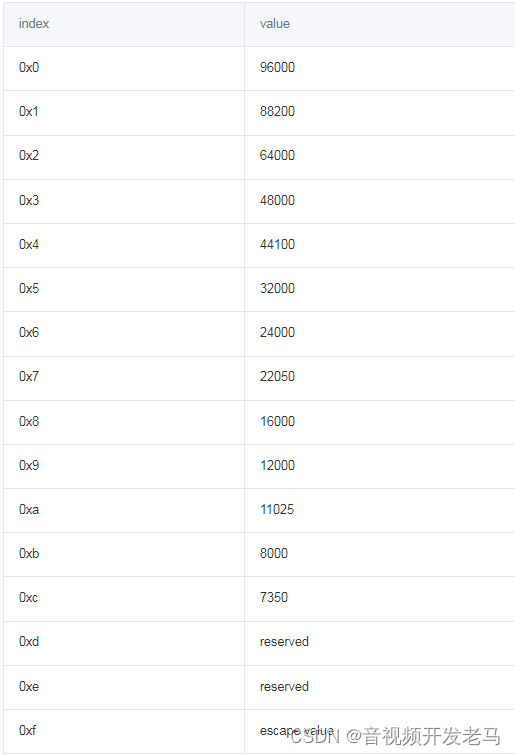
我们常用的 AAC 音频同步包的大小固定为 4 字节,前两个字节被称为 AACDecoderSpecificInfo,用于描述这个音频包应当如何被解析,后两个字节称为 AudioSpecificConfig,更加详细的指定了音频格式。下图是一个 AAC 音频同步包的示例:
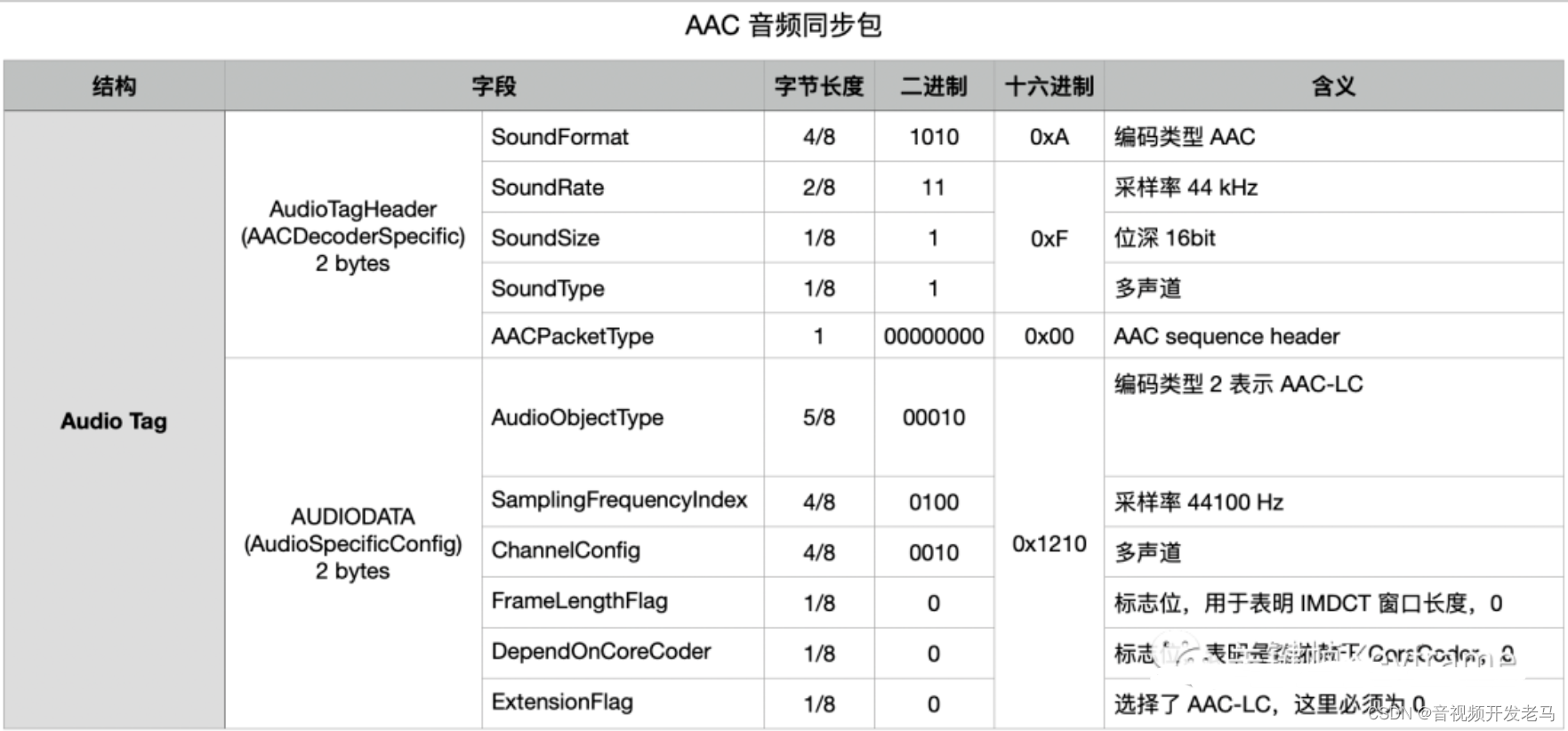
在完成 AAC 音频同步包的发送后,我们就可以向服务器推送普通的 AAC 数据包了。在发送数据包时,AACDecoderSpecificInfo 则变为 0xAF01,向服务器说明这个包是普通 AAC 数据包。如果这里的 AAC 数据有包含 7 个字节 ADTS 头(若存在 CRC 校验,则是 9 个字节),那么要去掉这个头后,把裸数据放到这里。如果这里是采集到的裸数据,没有 ADTS 头,那么这里就不需要这样处理了。下图是一个 AAC 音频数据包的示例:
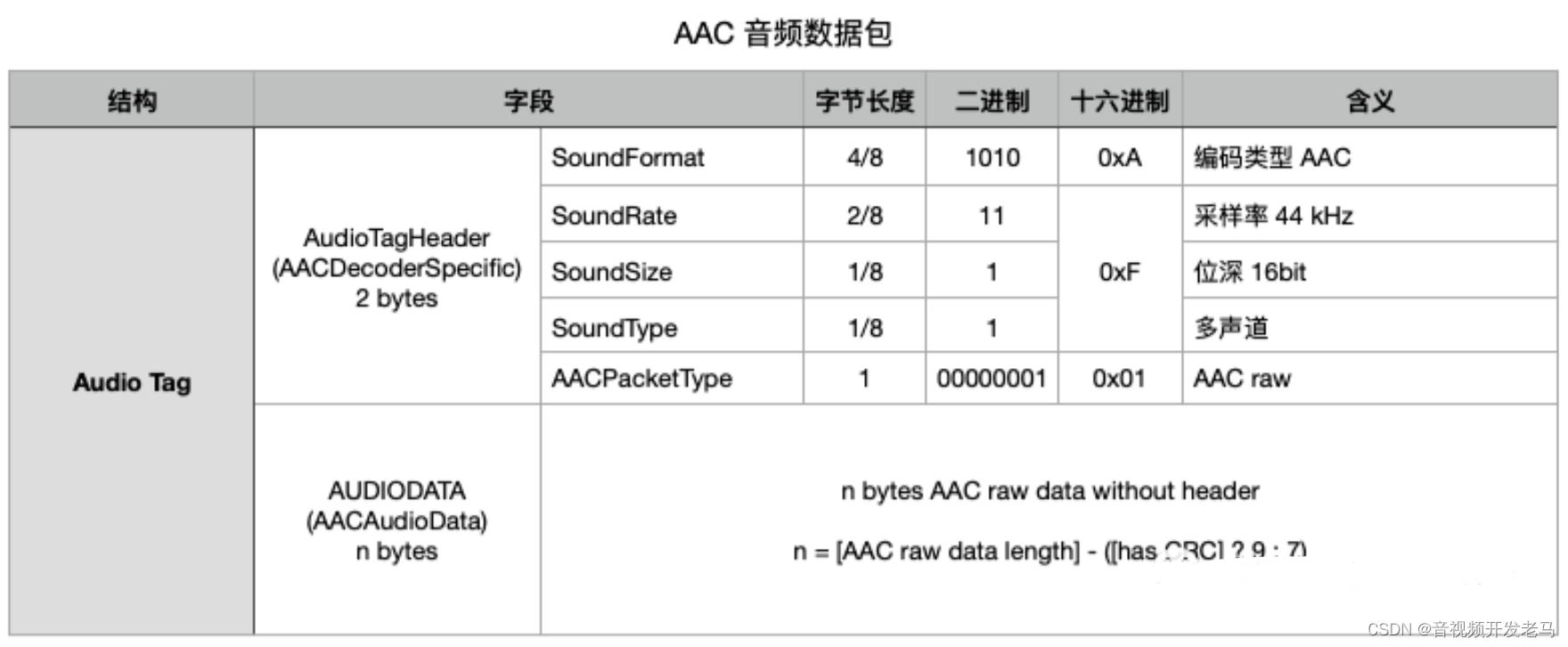
对应的,在解析 FLV 时,如果封装的是 AAC 的音频,要在每帧 AAC ES 流前把 7 个字节 ADTS 头添加回来,这是因为 ADTS 是解码器通用的格式,纯的 AAC ES 流要打包成 ADTS 格式的 AAC 文件,解码器才能正常解码。在打包 ADTS 的时候,需要用到 samplingFrequencyIndex 这个信息,samplingFrequencyIndex 最准确的信息是存储在 AudioSpecificConfig 中。
免费的音视频学习资料领取,见文章最后。

有关 AudioSpecificConfig 结构解析的代码,可以参考 ffmpeg/libavcodec/mpeg4audio.c 中的 avpriv_mpeg4audio_get_config 函数。
- int avpriv_mpeg4audio_get_config(MPEG4AudioConfig *c, const uint8_t *buf, int bit_size, int sync_extension)
- {
- GetBitContext gb;
- int ret;
-
- if (bit_size <= 0)
- return AVERROR_INVALIDDATA;
-
- ret = init_get_bits(&gb, buf, bit_size);
- if (ret < 0)
- return ret;
-
- return ff_mpeg4audio_get_config_gb(c, &gb, sync_extension);
- }
-
- int ff_mpeg4audio_get_config_gb(MPEG4AudioConfig *c, GetBitContext *gb, int sync_extension)
- {
- int specific_config_bitindex, ret;
- int start_bit_index = get_bits_count(gb);
- c->object_type = get_object_type(gb);
- c->sample_rate = get_sample_rate(gb, &c->sampling_index);
- c->chan_config = get_bits(gb, 4);
- if (c->chan_config < FF_ARRAY_ELEMS(ff_mpeg4audio_channels))
- c->channels = ff_mpeg4audio_channels[c->chan_config];
- c->sbr = -1;
- c->ps = -1;
- if (c->object_type == AOT_SBR || (c->object_type == AOT_PS &&
- // check for W6132 Annex YYYY draft MP3onMP4
- !(show_bits(gb, 3) & 0x03 && !(show_bits(gb, 9) & 0x3F)))) {
- if (c->object_type == AOT_PS)
- c->ps = 1;
- c->ext_object_type = AOT_SBR;
- c->sbr = 1;
- c->ext_sample_rate = get_sample_rate(gb, &c->ext_sampling_index);
- c->object_type = get_object_type(gb);
- if (c->object_type == AOT_ER_BSAC)
- c->ext_chan_config = get_bits(gb, 4);
- } else {
- c->ext_object_type = AOT_NULL;
- c->ext_sample_rate = 0;
- }
- specific_config_bitindex = get_bits_count(gb);
-
- if (c->object_type == AOT_ALS) {
- skip_bits(gb, 5);
- if (show_bits_long(gb, 24) != MKBETAG('\0','A','L','S'))
- skip_bits_long(gb, 24);
-
- specific_config_bitindex = get_bits_count(gb);
-
- ret = parse_config_ALS(gb, c);
- if (ret < 0)
- return ret;
- }
-
- if (c->ext_object_type != AOT_SBR && sync_extension) {
- while (get_bits_left(gb) > 15) {
- if (show_bits(gb, 11) == 0x2b7) { // sync extension
- get_bits(gb, 11);
- c->ext_object_type = get_object_type(gb);
- if (c->ext_object_type == AOT_SBR && (c->sbr = get_bits1(gb)) == 1) {
- c->ext_sample_rate = get_sample_rate(gb, &c->ext_sampling_index);
- if (c->ext_sample_rate == c->sample_rate)
- c->sbr = -1;
- }
- if (get_bits_left(gb) > 11 && get_bits(gb, 11) == 0x548)
- c->ps = get_bits1(gb);
- break;
- } else
- get_bits1(gb); // skip 1 bit
- }
- }
-
- //PS requires SBR
- if (!c->sbr)
- c->ps = 0;
- //Limit implicit PS to the HE-AACv2 Profile
- if ((c->ps == -1 && c->object_type != AOT_AAC_LC) || c->channels & ~0x01)
- c->ps = 0;
-
- return specific_config_bitindex - start_bit_index;
- }

3、Video Tags 解析
Video Tag 的结构大致如下所示:
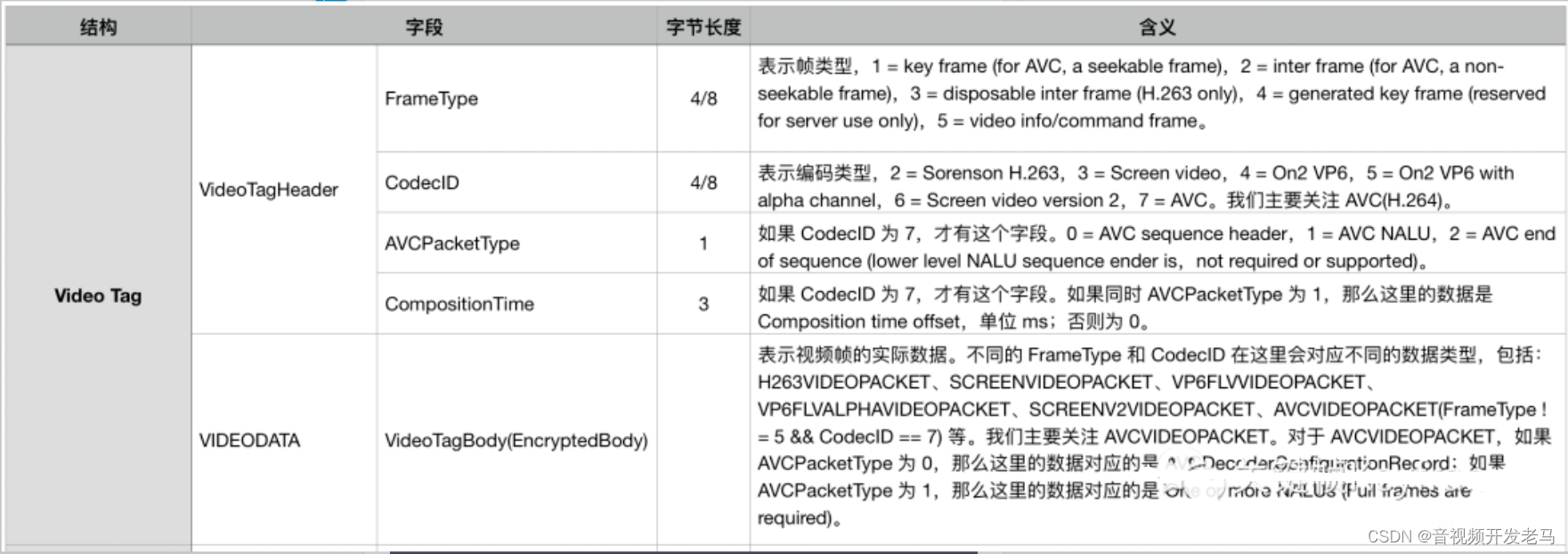
如上图所示,一般在 VideoTagHeader 后面跟着的就是 VIDEODATA 数据了,但是对于 AVC(H.264) 的编码格式来说,VideoTagHeader 会多出两个字段 AVCPacketType 和 CompositionTime。AVCPacketType 是表示后面 VIDEODATA 的类型,CompositionTime 则表示 pts 和 dts 的差值。
如果 AVCPacketType 为 0,那么这里的数据对应的是 AVCDecoderConfigurationRecord;如果 AVCPacketType 为 1,那么这里的数据对应的是 One or more NALUs(Full frames are required)。
AVCDecoderConfigurationRecord 记录的是 AVC(H.264)解码相关比较重要的 sps 和 pps 信息,解码器在解码数据之前需要首先获取的 sps 和 pps 的信息。在做 seek 或者断流重连等操作引起解码器重启时,也需要给解码器再传一遍 sps 和 pps 信息。
在 FLV 的文件中,一般情况下 AVCDecoderConfigurationRecord 只会出现一次,即第一个 Video Tag。如果视频使用 AVC,那么这个 Tag 就是 AVC sequence header,即 AVC 视频同步包。AVCDecoderConfigurationRecord 结构的在 ISO/IEC-14496-15 AVC file format 标准中有做说明。
下面是 ISO/IEC 14496-15, 5.3.3.1.2 AVCDecoderConfigurationRecord:
- aligned(8) class AVCDecoderConfigurationRecord {
- unsigned int(8) configurationVersion = 1;
- unsigned int(8) AVCProfileIndication;
- unsigned int(8) profile_compatibility;
- unsigned int(8) AVCLevelIndication;
- bit(6) reserved = '111111'b;
- unsigned int(2) lengthSizeMinusOne;
- bit(3) reserved = '111'b;
- unsigned int(5) numOfSequenceParameterSets;
- for (i = 0; i < numOfSequenceParameterSets; i++) {
- unsigned int(16) sequenceParameterSetLength ;
- bit(8*sequenceParameterSetLength) sequenceParameterSetNALUnit;
- }
- unsigned int(8) numOfPictureParameterSets;
- for (i = 0; i < numOfPictureParameterSets; i++) {
- unsigned int(16) pictureParameterSetLength;
- bit(8*pictureParameterSetLength) pictureParameterSetNALUnit;
- }
- if (profile_idc == 100 || profile_idc == 110 ||
- profile_idc == 122 || profile_idc == 144)
- {
- bit(6) reserved = '111111'b;
- unsigned int(2) chroma_format;
- bit(5) reserved = '11111'b;
- unsigned int(3) bit_depth_luma_minus8;
- bit(5) reserved = '11111'b;
- unsigned int(3) bit_depth_chroma_minus8;
- unsigned int(8) numOfSequenceParameterSetExt;
- for (i = 0; i < numOfSequenceParameterSetExt; i++) {
- unsigned int(16) sequenceParameterSetExtLength;
- bit(8*sequenceParameterSetExtLength) sequenceParameterSetExtNALUnit;
- }
- }
- }

下面是 ITU-T H.264(ISO/IEC 14496-10), A.2 Profiles:
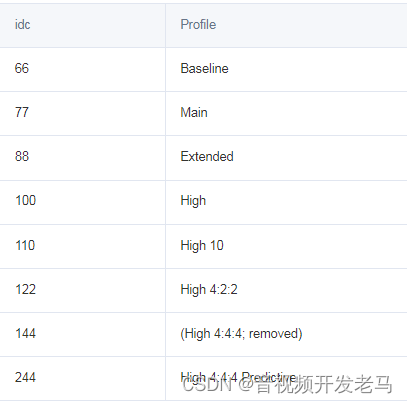
下面是 ITU-T H.264(ISO/IEC 14496-10), A.3 Levels:
- Defined level_idc: 10, 9[^1], 11, 12, 13, 20, 21, 22, 30, 31, 32, 40, 41, 42, 50, 51, 52
-
- [^1]: "level_idc==9" represents "Leve 1b" unless Baseline(Constrained Baseline), Main, or Extended profiles.
下面是 ISO/IEC 14496-15, 8.3.3.1.2 HEVCDecoderConfigurationRecord:
- aligned(8) class HEVCDecoderConfigurationRecord {
- unsigned int(8) configurationVersion = 1;
- unsigned int(2) general_profile_space;
- unsigned int(1) general_tier_flag;
- unsigned int(5) general_profile_idc;
- unsigned int(32) general_profile_compatibility_flags;
- unsigned int(48) general_constraint_indicator_flags;
- unsigned int(8) general_level_idc;
- bit(4) reserved = ‘1111’b;
- unsigned int(12) min_spatial_segmentation_idc;
- bit(6) reserved = ‘111111’b;
- unsigned int(2) parallelismType;
- bit(6) reserved = ‘111111’b;
- unsigned int(2) chromaFormat;
- bit(5) reserved = ‘11111’b;
- unsigned int(3) bitDepthLumaMinus8;
- bit(5) reserved = ‘11111’b;
- unsigned int(3) bitDepthChromaMinus8;
- bit(16) avgFrameRate;
- bit(2) constantFrameRate;
- bit(3) numTemporalLayers;
- bit(1) temporalIdNested;
- unsigned int(2) lengthSizeMinusOne;
- unsigned int(8) numOfArrays;
- for (j=0; j < numOfArrays; j++) {
- bit(1) array_completeness;
- unsigned int(1) reserved = 0;
- unsigned int(6) NAL_unit_type;
- unsigned int(16) numNalus;
- for (i=0; i< numNalus; i++) {
- unsigned int(16) nalUnitLength;
- bit(8*nalUnitLength) nalUnit;
- }
- }
- }

下面是 ITU-T H.265(ISO/IEC 23008-2), A.3 Profiles:
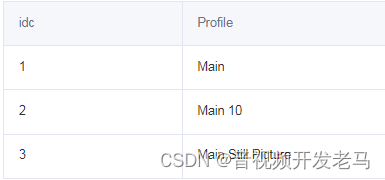
下面是 ITU-T H.265(ISO/IEC 23008-2), A.4 Tiers and levels:

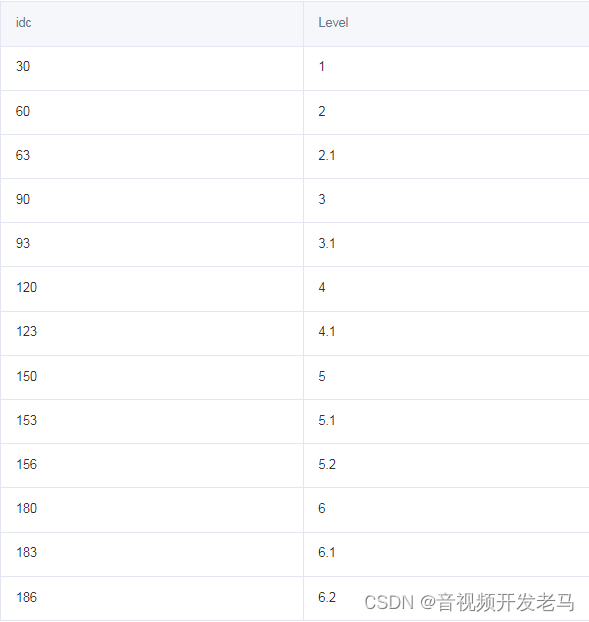
下图是一个 AVC 视频同步包的示例,其中红框部分对应的是 VIDEODATA:
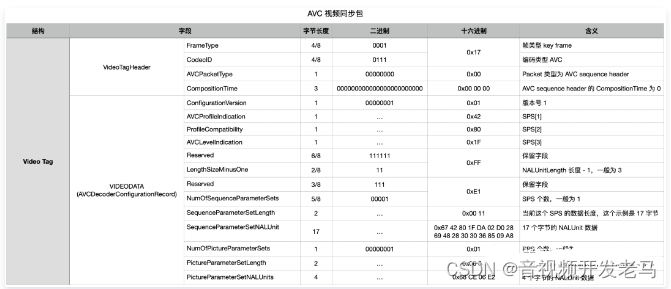
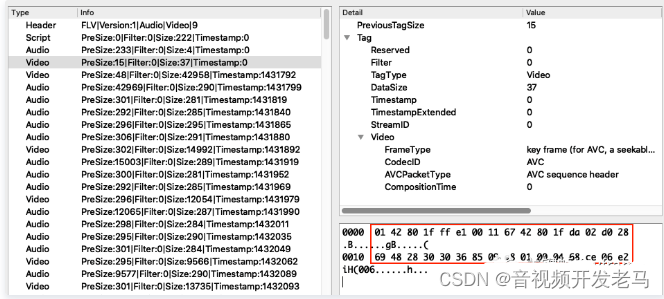
下图是一个 AVC 视频数据包的示例,其中红框部分对应的是 VIDEODATA:

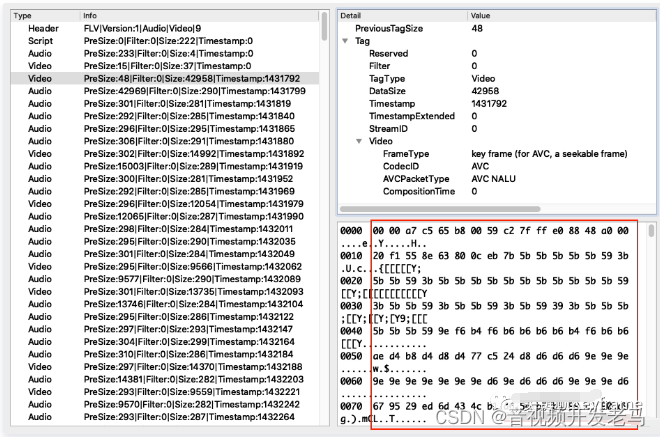
有关 AVCDecoderConfigurationRecord 结构解析的代码,可以参考 ffmpeg/libavformat/avc.c 中的 ff_isom_write_avcc 函数。
- int ff_isom_write_avcc(AVIOContext *pb, const uint8_t *data, int len)
- {
- if (len > 6) {
- /* check for H.264 start code */
- if (AV_RB32(data) == 0x00000001 ||
- AV_RB24(data) == 0x000001) {
- uint8_t *buf=NULL, *end, *start;
- uint32_t sps_size=0, pps_size=0;
- uint8_t *sps=0, *pps=0;
-
- int ret = ff_avc_parse_nal_units_buf(data, &buf, &len);
- if (ret < 0)
- return ret;
- start = buf;
- end = buf + len;
-
- /* look for sps and pps */
- while (end - buf > 4) {
- uint32_t size;
- uint8_t nal_type;
- size = FFMIN(AV_RB32(buf), end - buf - 4);
- buf += 4;
- nal_type = buf[0] & 0x1f;
-
- if (nal_type == 7) { /* SPS */
- sps = buf;
- sps_size = size;
- } else if (nal_type == 8) { /* PPS */
- pps = buf;
- pps_size = size;
- }
-
- buf += size;
- }
-
- if (!sps || !pps || sps_size < 4 || sps_size > UINT16_MAX || pps_size > UINT16_MAX)
- return AVERROR_INVALIDDATA;
-
- avio_w8(pb, 1); /* version */
- avio_w8(pb, sps[1]); /* profile */
- avio_w8(pb, sps[2]); /* profile compat */
- avio_w8(pb, sps[3]); /* level */
- avio_w8(pb, 0xff); /* 6 bits reserved (111111) + 2 bits nal size length - 1 (11) */
- avio_w8(pb, 0xe1); /* 3 bits reserved (111) + 5 bits number of sps (00001) */
-
- avio_wb16(pb, sps_size);
- avio_write(pb, sps, sps_size);
- avio_w8(pb, 1); /* number of pps */
- avio_wb16(pb, pps_size);
- avio_write(pb, pps, pps_size);
- av_free(start);
- } else {
- avio_write(pb, data, len);
- }
- }
- return 0;
- }

4、Data Tags 解析
Data Tag 的结构大致如下所示:

其中 ScriptTagBody 中的 Name 和 Value 字段都是 SCRIPTDATAVALUE 类型。Name 最终对应的是 String 类型,Value 最终对应的是 ECMA array 类型。
SCRIPTDATAVALUE 包含两个字段:Type 和 ScriptDataValue,前者表示数据的类型,后者装载实际数据。
- SCRIPTDATAVALUE:
- 0 = Number
- 1 = Boolean
- 2 = String
- 3 = Object
- 4 = MovieClip (reserved, not supported)
- 5 = Null
- 6 = Undefined
- 7 = Reference
- 8 = ECMA array
- 9 = Object end marker
- 10 = Strict array
- 11 = Date
- 12 = Long string
- Type:定义数据的类型
- ScriptDataValue:数据值
这些数据都是以 AMF(Action Message Format) 的形式编码。
Data Tag 里可以承载不同的数据,其中我们最关心是的音视频的 metadata 元信息数据,这些信息是以一个 Name 为 onMetadata 的 SCRIPTDATA Tag 来存储的。
4.1、onMetadata 解析
onMetadata 包含着不同的属性,这些属性对于不同的 FLV 文件可能各不相同。
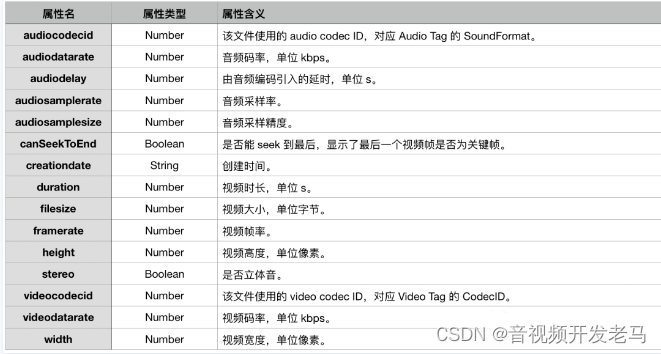
本文参考
1)Adobe Flash Video File Format Specification
https://www.adobe.com/content/dam/acom/en/devnet/flv/video_file_format_spec_v10_1.pdf
2)基于 libRTMP 的流媒体直播之 AAC、H264 推送
https://blog.51cto.com/billhoo/1557646
3)RTMP 协议发送 H.264 编码及 AAC 编码的音视频 https://www.cnblogs.com/haibindev/archive/2011/12/29/2305712.html
4)ISO IEC 14496-15-2017 http://www.doc88.com/p-8951310719017.html
通过上文的介绍,我们了解了 FLV 视频封装格式,并探讨了其中 Audio Tags、Video Tags、Data Tags 等模块的具体结构。


